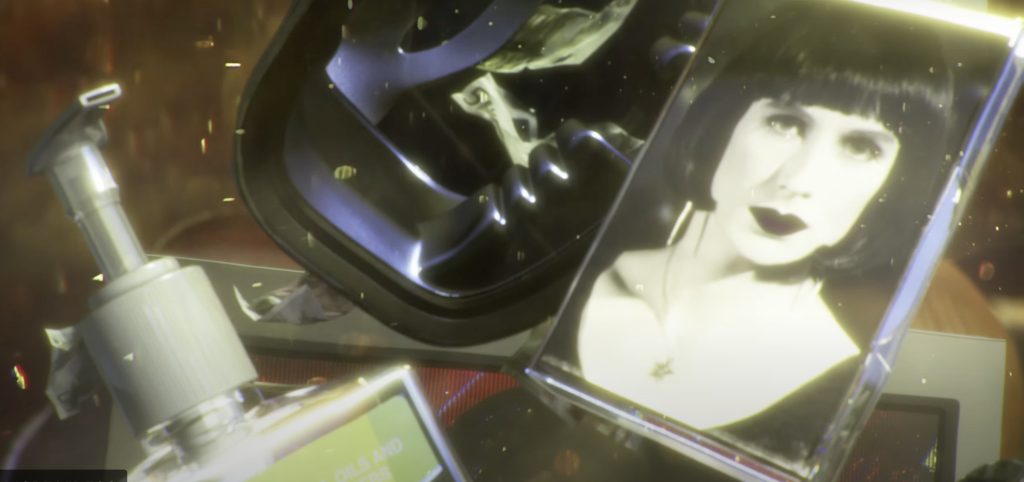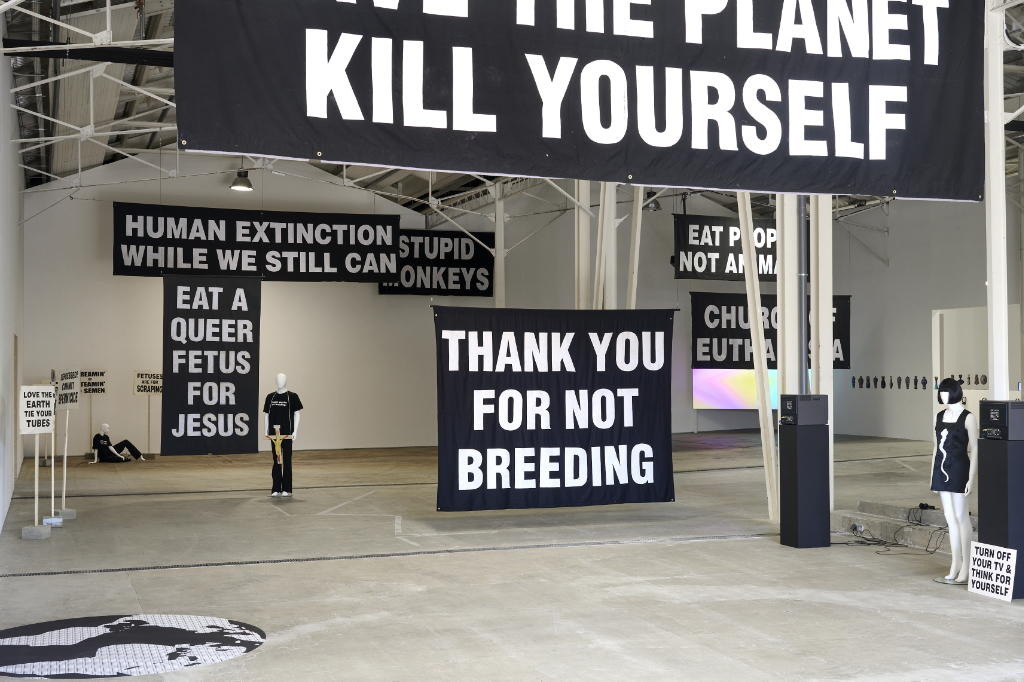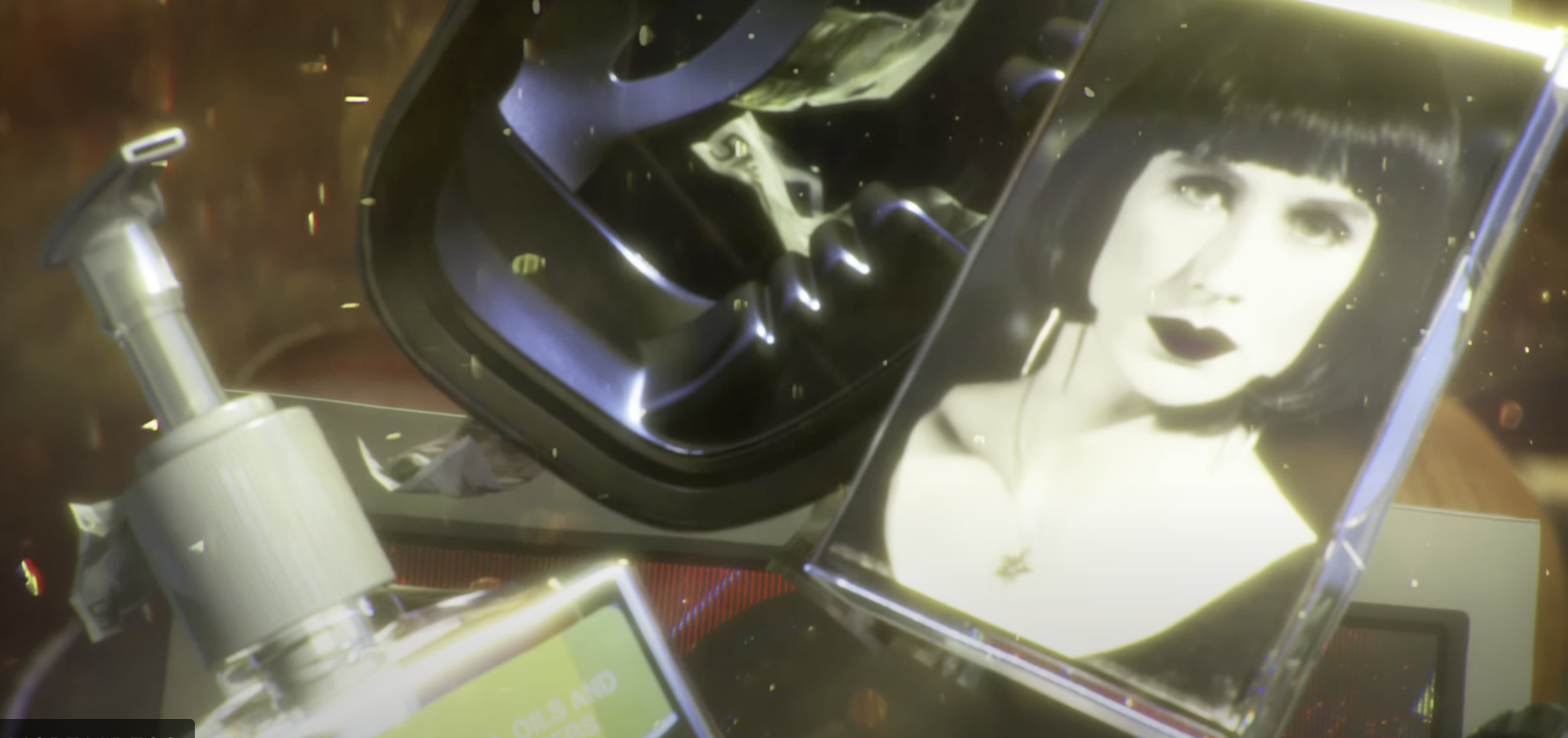Text by Andra Amber Nikolayi

While billionaires like Elon Musk and Jeff Bezos tout colonising Mars and space exploration as the solution that would save the human race, multi-faceted artist and musician Chris Korda’s approach may seem almost nihilistic by contrast. It’s as if they didn’t get the memo about the lethality of space; I think this is so fascinating, she says.
A fervent ecologist, Korda is often referred to as an “anti-humanist”. In contrast, she prefers to see herself as more of a science pragmatist, a way of thinking extensively documented on her Metadelusion blog [1]. However, in the wake of the acceleration of the climate crisis, her work has recently come back into the spotlight. Korda rose to prominence in the ‘90s as the founder of the Church of Euthanasia [2], a mysterious pseudo-religious entity whose only commandment was ‘’Do not procreate” as a means of fighting overpopulation. Their provocative actions and the iconic slogan “Save the planet, kill yourself!” may have often been confusing and misconstrued, but they certainly had people’s attention. Through protests, hanging huge banners, distributing pamphlets, stickers and even a spot on the infamous daytime TV Jerry Springer Show, the Church of Euthanasia was practising a form of Dadaist culture jamming filled with dark humour to get their ecological message across, which seemed like the right thing to do at the time.
While the Church’s actions are what Korda is mainly associated with, her artistic career spanning almost three decades stretches across a wide variety of mediums, from photography, video art and collage to sculpture, digital art, text and conceptual art, to name just a few. The newly inaugurated retrospective The (Wo)Man of the Future at the Le Confort Moderne, a contemporary art centre in Poitiers, France, is the most extensive survey of her work to date.
At the core of her many endeavours, ecology remains the throughline, with music as her main form of expression. In the age where the impending climate disaster seems more of a certainty than a speculation, her message is all the more powerful. Her music career started out as a means to spread the Church’s message. Her track “Save the planet, kill yourself!” is a massive, belting house track that became an unlikely Ibiza summer hit.
However, working on that particular track put Korda face to face with the limitations of technology at the time, prompting her to develop her own software and the polymeter MIDI sequencer later. In the ‘90s, you had to have several drum machines play at once to obtain that phasing effect. Working with the polymeter is one of Korda’s greatest innovations in music to date. Having spent years working as a computer programmer and systems engineer, she’s been developing custom programs that would help her express her musical vision. I’m making valuable contributions, but for the most part, they’re not recognised as such because I’m perceived as an outsider, she says. Her free software is still the most efficient way to work with polymer available.
Her latest album, Passion for Numbers, sees her take this research even further into the realm of atonal music. I feel like I contributed a lot, unbeknownst to most people, to not only the practice and also the theory of polymeter and phasing and increasingly to atonal music, she says. She’s always wanted to work with classical instruments; only it wasn’t until recently that good digital piano emulators appeared.
The big thing that’s changed by the time I started Passion for numbers I had a much deeper awareness and feeling for atonal music, she says. That’s because of my new systems that I’ve been developing, which are not necessarily based in polymeter, though there’s a ton of polymeter on Passion for Numbers, which is no longer the only trick in my arsenal.[…] I’m using obscure art, which is incredibly old and very British and dates back to the 16th century; it’s called change ringing, also known as method ringing [3], which has to do with church bells. The other main technique I’m using is called Gray code [4], which is so esoteric that I feel bad for even explaining it. Still, if you’re an electrical engineer, you probably know all about it.
According to Korda, atonal music suffers from what she calls the cat walking around on the piano problem, which she mostly associates with composers like Schoenberg. One of the reasons that people find it hard to listen to guys like Schonberg is because his numerical systems tended to produce chromatic tone clusters, something where you have C, C sharp and maybe D all at once, and this turns out to be intolerable for human beings, she says. The problem of atonal music is how we can work with all those tones without having the cat walking around on the piano, and it turns out that Gray code and its related concepts, this idea of gradual change is one solution to that problem. I
t’s a way of arranging things so you can a bunch of tonalities in a row that you can look at and think, wow, that’s really extreme. Still, if you step through them gradually enough, only changing one note at the time so that each chord is very strongly connected to its predecessor and next chord, you’d be surprised how drastic a chord progression can be. It’s still perceived as beautiful, she says. This was a real shocker for me, and the main thing that I discovered prior to Passion for Numbers, which motivated me, was sharing this realisation that I think is very deep, and I think other people could benefit from this.



Thematically, ecology has been a constant in her music. She is not shy to express her firm belief that our chances of survival are here and now, on this planet which is the only one we’ve got. The neoliberal assault is pandering to humanity’s worst instincts at every level, including at the level of whether or not we will have a habitable planet in the future. It seems pretty obvious to me that even though rich people may claim to care about their own children, in practice, they behave as if they don’t, she says. Because the plan that we’re following and that they’re preaching to us, which I’m not in a position to determine the outcome to, that’s up to Elon Musk and his buddies, they’re controlling the levers of our society, and it appears to me that their plan is what? To escape to mars? Really, that’s the plan? That’s not much of a plan!
I don’t think that humanity deserves to be annihilated or to annihilate itself; we don’t deserve anything; we determine what will happen to ourselves; it’s not like that at all! she says. It’s always going to be a choice between two regrettable alternatives – either humanity survived a bit longer, sure after a billion years, Earth is no longer inhabitable. Or, it’s going to be over in a 100 years, those are the kind of options we’re going to be reconciling ourselves to, and on that, my single biggest influence and a book that I encourage every one of Earth (and everyone who reads your magazine) to read is the wonderful Earth in Human Hands.
Everyone should read that because it really puts things in perspective! It’s by a NASA exoplanet biologist who studies exoplanets and knows all about the Drake equation [5], Fermi’s paradox [6] and what he’s telling us is – look, most of the time, intelligence doesn’t work out. The first sign that it is working out and that there’s hope would be if we suddenly start prioritising long-term survival over everything else. […] Most of the time, intelligence becomes intoxicated with irrational exuberance, a term from stock-market trading. The idea is we begin to feel omnipotent because we’re the only real autonomous agent on Earth, […] we feel that the rules don’t apply to us.
We forget the all-important fact that our gut bacteria outnumber us and our bodies; it’s like that. We have a very complex, uneasy alliance with other living things, and that is the reality, and we ignore that, and we behave like we’re lords of the planet. We get to do whatever we want, and pretty soon, we’re gone, and it’s nothing personal; it’s not that the Earth’s had it in for us. I feel like that’s the message that I’m trying to capture in all of my works, especially in Apologize to the Future.
On A Thin Layer of Oily Rock, from her 2020 album Apologize to the Future, she writes:
Galaxies spin
Ignoring our prayers
Fields of gravity
Crushing space
Waves and particles
Glued into place
By the strong and the weak
The cold and the hot
Radiating light
To a tiny dot
In exploding chaos
There never was a plan
So you better get real
While you still can
It don’t mean a thing
Except maybe to us
A flash in the pan
Before we’re dust
The track is a reference to palaeontology, where during the extinction in the Permian Triassic, a rather narrow line could be observed on certain specimens that would encompass everything that died within that period. That’s what all of humanity’s hopes and dreams and knowledge and accomplishments and aspirations, all of that will be reduced to a thin layer of oily rock if we can’t manage to get through this bottleneck that we’re currently passing through, she says in a 2020 interview with Roc Jiménez de Cisneros for Objecthood [7].
In the same conversation, she expands on the futility of this idea of humanity enduring as a space-steading species. When Peter Ward, the famous palaeontologist who wrote “Under a Green Sky,” said that humanity shouldn’t worry so much about escaping to exoplanets because we’re going to be too busy moving our airports. This set me back when I understood what he meant. The point is, what percentage would you guess of the airports that humanity has built for itself are at sea level? she says. The answer is that cities were built at sea level because, at the time when most cities evolved, boats were the only means of international transport.
She believes that the already devastating climate change effects we’ve been experiencing are nothing compared to what the process is capable of. If you melted all of the ice—and by the way, that has happened in the history of Earth without any assistance from humans in the past, we’ve had an ice-free planet where there were giant reptiles where the Arctic Circle is now—so if you melt all the ice, basically every coastline on Earth is submerged, she says in the same interview.
The co-founder of The Church of Euthanasia works in an astronomy lab, and every time the subject comes up, he just laughs. He says – you’d be amazed how hard it is to make a satellite that can withstand the hard radiation in space”. A satellite! It’s got all computers and stuff; it’s got no tissue anywhere in it. Once you put a biological thing out there, it will get cancer. That’s what radiation does – it breaks down DNA; the whole thing is a pure fantasy, she says.
This relatively sober outlook on space exploration is something that recent sci-fi TV works like The Expanse or For All Mankind have tackled. Romanian writer, curator and thinker Ştefan Tiron excellently pointed out in a recent essay [8] how a show like The Expanse illustrates more realistic aspects of space travel, like the effects of cosmic radiation and how utterly inhospitable outer space can be. He also praises the series for its portrayal of class struggle. Finally, he emphasises the importance of adapting this type of more recent sci-fi work that tackles contemporary society’s current issues.
I think this was something that The Church of Euthanasia was on to from the very beginning – was this idea of positing euthanism, or whatever you wanna call it, against transhumanism, Korda says. Essentially, we’re saying that from the point of view of euthanism, which is grounded in realism, pragmatism, transhumanism looks more and more like Catholicism – they’re both embracing escapism. In both systems, though one is religious and one is not, the answer to every question is always it doesn’t matter, we’re going to escape, we’re going somewhere else.
To Catholics, we’re going to Heaven, we’re going to the happy place, or at least the nice people are; to transhumanists, we’re going to Mars, or we’re going to download ourselves into machines. Whatever it is, their answer is always it doesn’t matter what happens on Earth. Except that actually, it is going to matter what happens on Earth because if we fuck up Earth badly enough, it’s just going to be the Permian-Triassic extinction and humanity is just erased from Earth’s hard drive.
So if we are not to become space lords anytime soon, what can we do to protect the only home we have left? As society struggles to take comprehensive, large-scale measures against climate change and governments and corporations continue to try and shift the focus towards individual responsibility, how can we cope with the impending doom? According to Reverend Korda, one simple step everyone can make is quite simple – don’t reproduce.






